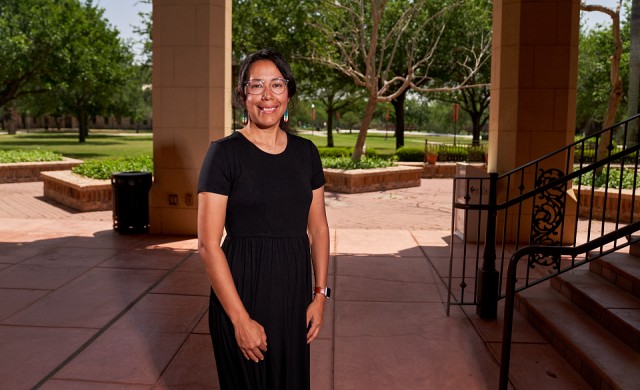UTRGV helping preserve the Voces of a Pandemic in the Valley
Thursday, April 29, 2021
Around Campus, Community
By Letty Fernandez
RIO GRANDE VALLEY, TEXAS – Students in Dr. Noreen Rivera’s American and Mexican American Literature and Cultural Studies classes at UTRGV are preserving the stories of Latinos affected by the COVID-19 pandemic.
As oral histories, their stories become part of a digital collection called Voces of a Pandemic, now housed in the university library’s Special Collections and Archives.
“My students have cast a wide net,” Rivera said. “There are memorable interviews with first responders – from police officers to nurses; a husband who experienced going through the delivery of his child during COVID times; a truck driver and how his work has changed; and fellow students who talk about how their educational experiences have changed.”
The original Voces (voices) project started more than 20 years ago by Dr. Maggie Rivas Rodriguez, founder and creator of the Voces Oral Center at the University of Texas at Austin. She identified the need to record and preserve the untold stories of Latinos and Latinas who served in the military or on the home front during World War II. The archive has since expanded to include veterans of the Korean and Vietnam Wars, and political and civic engagement, focusing on the continuing fight for Latino civil rights.
Then, when the COVID-19 pandemic began a year ago, Rivas reached out to colleges and universities across the country, inviting them to collaborate, to help capture and preserve the experiences of the Latino community during this historic time.
That is when Rivera got involved. She believed in Rivas’ project and decided to be part of the collaboration.
“Dr. Rivas was looking for partners. When I saw the call, I said ‘yes,’” Rivera said. “I wanted UTRGV to be a part of it.”
Rivera is now the coordinator of the UTRGV Voces of a Pandemic, a partnership with UT Austin.
“UTRGV has enriched the Voces of a Pandemic oral history project in a substantial way,” said Rivas. “The result is that we have many interviews from the Rio Grande Valley, providing us with a valuable window into how COVID-19 has shaped the lives of people that are part of our state.”
As Rivera began interviewing individuals, she wanted her students to also be involved in the process.
“I tell them to look for someone to share their stories of struggle and resilience. And if they are willing to participate, we invite them to preserve their story in the archives at UTRGV,” Rivera said.

When student Leslie Torres began working on the Voces project, she would listen to the interviews conducted by other students and edit the transcripts. Recently, she recorded her first interview.
“It has been an enriching experience This oral history project has humanized 2020 for me, and I know that in the future Voces will humanize the historical period of COVID-19,” said Torres, a junior history major. “It feels extremely meaningful and I feel working on the Voces project has reconnected me to the community.”
‘THE ABILITY TO HAVE EMPATHY’
Before they can do interviews, students undergo training. All interviews are recorded via Zoom for the continued safety of all participants.
“Professor Noreen Rivera has done a superb job of training her wonderful students on the many requirements of our project. And the library staff has been meticulous about making sure that their own requirements are met as well,” said Rivas.
To date, UTRGV students have collected nearly 100 interviews.
“For students who have not experienced drastic affects from COVID-19, like the loss of a loved one or a job, many realize that by interviewing someone who has experienced hardship and by listening to their stories, they can develop the ability to have empathy, to understand and share the feelings of another,” Rivera said.
“Gathering these voces is also a form of public community service and engagement. Students are preserving these stories at a time when it is crucial for Latinos to have their stories told, since Latinos, as an ethnic group, are being impacted by the pandemic in ways disproportionate to other groups in our nation.”
To be included in the project, participants must be 18 or older and a member of the Latinx community and must be willing to share their COVID-19 experiences.
“It’s all about hearing each other's stories,” Rivera said. “If we can listen and examine these stories, it allows us to move forward in a positive way as a local community and as a national and global society.”
To participate in the UTRGV Voces of a Pandemic, contact Rivera at Noreen.Rivera@utrgv.edu.
For more information on the project, visit https://scholarworks.utrgv.edu/voces/.
ABOUT UTRGV
The University of Texas Rio Grande Valley (UTRGV) was created by the Texas Legislature in 2013 as the first major public university of the 21st century in Texas. This transformative initiative provided the opportunity to expand educational opportunities in the Rio Grande Valley, including a new School of Medicine and a School of Podiatry, and made it possible for residents of the region to benefit from the Permanent University Fund – a public endowment contributing support to the University of Texas System and other institutions.
UTRGV has campuses and off-campus research and teaching sites throughout the Rio Grande Valley including Brownsville (formerly The University of Texas at Brownsville campus), Edinburg (formerly The University of Texas-Pan American campus), Harlingen, Weslaco, McAllen, Port Isabel, Rio Grande City and South Padre Island. UTRGV, a comprehensive academic institution, enrolled its first class in the fall of 2015; the School of Medicine welcomed its first class in the summer of 2016, and the School of Podiatric Medicine in the fall of 2022.
